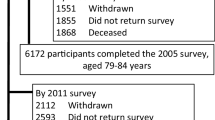Abstract
Background
Physical and mental component summary scores (PCS and MCS, respectively) are often used to summarise SF-36 quality of life subscales. This paper investigates PCS and MCS across the life course and compares the trajectories obtained from two different methods of calculation.
Methods
The Australian Longitudinal Study on Women’s Health is a population-based study with three cohorts of women and SF-36 surveys taken at multiple time points. Scoring coefficients for each component score were determined using factor analysis with uncorrelated (orthogonal) and correlated (oblique) rotation at the baseline survey, which were then used to compute correlated and uncorrelated PCS and MCS scores at each survey (scaled to have mean of 50 and standard deviation of 10 at baseline).
Results
For both methods, PCS declined progressively across the lifespan, while MCS rose in young and mid-age women to a peak and subsequently declined in later life. Differences were apparent between correlated and uncorrelated scores, most notably for MCS in the older cohort, where correlated MCS reached 54.6 but still less than uncorrelated MCS, with a random effects model indicating 1.63 (95 % confidence intervals 1.58–1.67) units difference; it then declined to a score of 51.2 by the last survey and the difference widened to 3.44 (3.38–3.50) units compared with the uncorrelated MCS.
Conclusions
PCS and MCS have distinct trajectories through life, with differences in results from correlated and uncorrelated component summary scores. The divergence is most notable with MCS, especially for older women, suggesting that correlated MCS and PCS should be used when examining change in health over time in this age group.


Similar content being viewed by others
References
Contopoulos-Ioannidis, D. G., Karvouni, A., Kouri, I., & Ioannidis, J. P. (2009). Reporting and interpretation of SF-36 outcomes in randomised trials: Systematic review. BMJ, 338, a3006.
Ware, J. E., Kosinski, M., & Keller, S. D. (1994). SF-36 Physical and Mental Health Summary Scales: A user’s manual. Boston, MA: The Health Institute, New England Medical Center.
Taft, C., Karlsson, J., & Sullivan, M. (2001). Do SF-36 summary component scores accurately summarize subscale scores? Quality of Life Research, 10(5), 395–404.
Anagnostopoulos, F., Niakas, D., & Tountas, Y. (2009). Comparison between exploratory factor-analytic and SEM-based approaches to constructing SF-36 summary scores. Quality of Life Research, 18(1), 53–63.
Simon, G. E., Revicki, D. A., Grothaus, L., & Vonkorff, M. (1998). SF-36 summary scores: Are physical and mental health truly distinct? Medical Care, 36(4), 567–572.
Hann, M., & Reeves, D. (2008). The SF-36 scales are not accurately summarised by independent physical and mental component scores. Quality of Life Research, 17(3), 413–423.
Wilson, D., Parsons, J., & Tucker, G. (2000). The SF-36 summary scales: Problems and solutions. Sozial- und Praventivmedizin, 45(6), 239–246.
Farivar, S. S., Cunningham, W. E., & Hays, R. D. (2007). Correlated physical and mental health summary scores for the SF-36 and SF-12 Health Survey, V.I. Health Quality of Life Outcomes, 5, 54.
Ware, J. E., & Kosinski, M. (2001). Interpreting SF-36 summary health measures: A response. Quality of Life Research, 10(5), 405–413.
Lee, C., Dobson, A. J., Brown, W. J., et al. (2005). Cohort profile: The Australian longitudinal study on women’s health. International Journal of Epidemiology, 34(5), 987–991.
Mishra, G., & Schofield, M. J. (1998). Norms for the physical and mental health component summary scores of the SF-36 for young, middle-aged and older Australian women. Quality of Life Research, 7(3), 215–220.
Diggle, P. J., Heagerty, P., Liang, K.-Y., & Zeger, S. (2002). Analysis of longitudinal data. New York: Oxford University Press.
SAS Institute Inc. Base SAS® 9.3 Utilities: Reference. (2011). Cary, NC: SAS. Institute Inc.
Ruo, B., Baker, D. W., Thompson, J. A., Murray, P. K., Huber, G. M., & Sudano, J. J., Jr. (2008). Patients with worse mental health report more physical limitations after adjustment for physical performance. Psychosomatic Medicine, 70(4), 417–421.
Churchill, R. (2010). No health without mental health: A role for the Cochrane collaboration. Cochrane Database Systematic Review, 8, ED000012.
Jokela, M., Ferrie, J. E., Gimeno, D., et al. (2010). From midlife to early old age: Health trajectories associated with retirement. Epidemiology, 21(3), 284–290.
Acknowledgments
The Australian Longitudinal Study on Women’s Health is funded by the Australian Department of Health and Ageing, and GDM is supported by the Australian National Health and Medical Research Council (APP1000986).
Author information
Authors and Affiliations
Corresponding author
Rights and permissions
About this article
Cite this article
Mishra, G.D., Hockey, R. & Dobson, A.J. A comparison of SF-36 summary measures of physical and mental health for women across the life course. Qual Life Res 23, 1515–1521 (2014). https://doi.org/10.1007/s11136-013-0586-3
Accepted:
Published:
Issue Date:
DOI: https://doi.org/10.1007/s11136-013-0586-3



